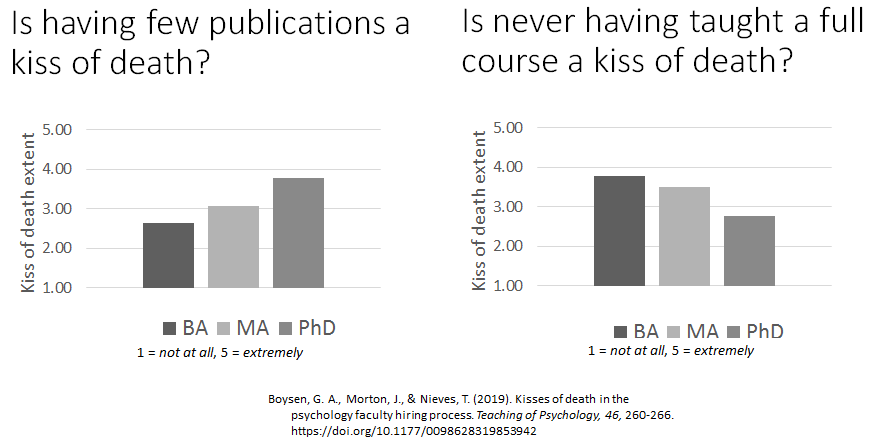By Dr. Guy A. Boysen, McKendree University
My wife and I were recently on the market for a car. We had a list of “must have” features: four doors, a sunroof, heated seats, under 30,000 miles, and less than 4 years old. When a pushy salesperson tried to get us to drive cars without these features, my reaction was “Not interested, bye,” not “Yes, I would love to buy different car than I asked for!” Academic search committees can be choosy too.
Faculty positions in psychology often yield dozens of qualified applicants. As such, search committees can be selective. Poor fit is a kiss of death that leads to automatic rejection (Boysen, Morton, & Neives, 2019). Getting on the short list of applicants to be interviewed requires nearly perfect fit with the qualifications listed in the job advertisement.
Lots of great cars sit undriven on car lots, and lots of highly qualified candidates get rejected for faculty positions. No, I do not want an SUV, even if is top of the line. And, no, your amazing record of research or teaching will not get you a job unless it matches what the search committee is looking for.
The importance of fit cannot be overstated. In fact, there are several different types of fit to consider when applying for faculty positions (Boysen, 2019).
Specialty Area
The first type of fit to consider is specialty area. Search committees want someone with training and experience that falls into a specific area (e.g., clinical, cognitive, social). Candidates from other areas will be rejected. Despite all the work some candidates put into writing application materials that make themselves seem qualified for positions outside of their specialty area, the first line of their CVs may be the only thing search committees read if it lists the wrong specialty.
Research vs. Teaching
The second type of fit is with an institution’s relative focus on research and teaching (see more on this topic
here). For example, as illustrated by the figures, faculty at doctoral universities report that having few publications is
very much a kiss of death that leads to automatic rejection, but they are only
somewhat kisses of death at master’s universities and baccalaureate colleges (
Boysen et al., 2019). Teaching experience is essential too, but it follow the opposite pattern of importance by university type. Of course, at community colleges, there are no scholarship requirements, so extreme research productivity in the absence of teaching experience is a sign of poor fit.

Teaching and Research Topics
Job advertisements often list specific courses that successful candidates will be able to teach and specific areas of scholarship that successful candidates will be able to publish in. Although a candidate’s teaching and research area often overlaps with their specialty area, the two are not synonymous. Two psychologists in the same specialty area can have nonoverlapping teaching and research experiences. It is best not to stretch the truth about who you are as a psychologist. Neither you nor your future employer will be satisfied if you are hired to teach or do research in an area that does not fit your interests or expertise.
“Additional” Qualifications
Job advertisements can include a host of additional qualifications. Just to name a few examples, search committees may want candidates who know advanced statistical methods, who are dedicated to liberal arts education, who have assessment experience, or who have a commitment to diversity. Although qualifications like these may be categorized as “preferred,” “ideal,” or “additional,” do not treat them as optional. You can apply for positions where your CV does not cover every additional qualification, but you should take care to explain why you still think you are good candidate even without some of the qualifications. Ignoring holes in your CV is yet another kiss of death.
Conclusion: Your Final Checklist
When my wife and I were looking for cars, we created a list of features that became our car-search guide. You can do the same during your job search. Use the qualifications listed in job advertisements as a checklist for your application materials. Ensure that your materials – especially your CV and cover letter – demonstrate fit with most everything on the checklist. The search committee is assessing fit, and you should too.
References
Boysen, G. A. (2019). Becoming a psychology professor: Your guide to landing the right academic job. Washington, DC: American Psychological Association.
Boysen, G. A., Morton, J., & Nieves, T. (2019). Kisses of death in the psychology faculty hiring process. Teaching of Psychology, 46, 260-266. https://doi.org/10.1177/0098628319853942
Guy A. Boysen, PhD, is a Professor of Psychology at McKendree University. He received his Bachelor’s degree from Saint John’s University in Collegeville, Minnesota and his PhD from Iowa State University in Ames, Iowa. His scholarship emphasizes the teaching of psychology, professional development of teachers, and stigma toward mental illness. He is the author of Becoming a Psychology Professor: Your Guide to Landing the Right Academic Job and An Evidence-based Guide to College and University Teaching. Dr. Boysen is on the editorial staff at Teaching of Psychology and Scholarship of Teaching and Learning in Psychology. Visit https://thefullprofessor.wordpress.com/
Contact the Author
gaboysen@mckendree.edu
Twitter: @guyboysen
https://thefullprofessor.wordpress.com/